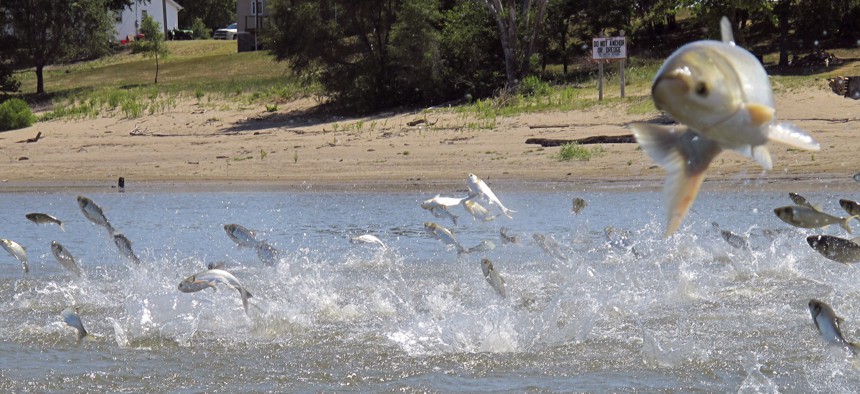$831 Million Project to Repel Invasive Fish From Great Lakes Gets Army Corps Greenlight

In this June 13, 2012, file photo, Asian carp, jolted by an electric current from a research boat, jump from the Illinois River near Havana, Ill. AP Photo/John Flesher, File

Connecting state and local government leaders
One advocate describes a “race against time” to block Asian carp, which pose a threat to native wildlife.
If invasive Asian carp spread from the Mississippi River basin into the Great Lakes, there are fears they could wreak havoc on native fish species and other aquatic life, threatening the health of the lakes and a recreational fishing industry said to be worth billions of dollars.
The U.S. Army Corps of Engineers top general on Friday signed off on a project meant to help prevent that outcome. With an estimated cost in the $700 million to $800 million range, the Brandon Road Lock and Dam project next needs congressional approval to proceed.
But getting the Corps blessing is seen as a significant step by advocates.
"It's really almost like a decade push to get it to this point,” said Drew YoungeDyke, a spokesman for the National Wildlife Federation.
He describes efforts to block the carp from invading the Great Lakes as a “race against time” and points out that if the carp prevail, there’s a risk they could spread further into connected rivers and thousands of lakes in states like Minnesota, Wisconsin and Michigan.
“It only takes a few Asian carp to really establish a population,” YoungeDyke said. “Once that population gets established, at least so far, it's been impossible to eradicate them.”
The Great Lakes region’s sport fishing industry, which depends on the health of fish other than Asian carp, is worth at least $7 billion annually, according to an estimate cited by YoungeDyke.
Four invasive carp species fall under the Asian carp umbrella—bighead, black, grass, and silver.
Known for their voracious appetites, and their ability to reproduce quickly, the carp can outcompete native fish for food and habitat and cause other ecological problems. The fish commonly weigh 20 to 40 pounds, but big ones can exceed 100 pounds.
Silver carp have a reputation for jumping nine to 10 feet out of the water when disturbed by the sound of motorboats, posing dangers for boaters and water-skiers.
The recommended plan for the Brandon Road Lock and Dam project would involve building new channel infrastructure at the site, which is near Joliet, Illinois along the Des Plaines River.
It would also feature a variety of underwater technology designed to ward off the invasive fish. This includes an electric field that would stun them, an “acoustic fish deterrent” that makes noise, and an “air bubble curtain” to sweep away small and stunned fish carried along in the recesses of barges.
There are some deterrent measures already in place to block the fish from entering the Great Lakes. But YoungeDyke described the Brandon Road project as “kind of our one chance to get stronger structural measures in place to keep Asian carp out.”
The project is planned at a choke point between the Mississippi River watershed and the Great Lakes. Northeast of the site, the Chicago Area Waterway System, a network of natural and manmade waterways, provides a potential passage for the fish to Lake Michigan.
A “chief’s report” for the project that Lt. Gen. Todd Semonite with the Corps approved Friday recommends a “phased” approach for the project that would cost an estimated $831 million, a spokesman for the agency explained by email.
“The phased approach allows for construction to be implemented incrementally which buys down some risk as that would mean some features of the project could be in the water sooner,” said Allen Marshall, corporate communications chief for the Corps Rock Island District.
An estimate in a report last year for an alternative “expedited” approach to construction pegged the cost at around $778 million.
If and when Congress authorizes the project it could opt to go with either approach.
Either way, the costs would be shared between the federal government and Illinois, with the federal government footing 65 percent of the bill.
Illinois Gov. JB Pritzker, a Democrat now in his first year in office, last month green-lighted the state to move ahead with initial engineering on the project. But he cited concerns that the project’s estimated expense has grown from $275 million.
"The State of Illinois is not in a financial position to commit to the full plan in its current form," the governor wrote in an April 26 letter to the Corps. "We have a multi-billion-dollar structural deficit and $15 billion in debt associated with unpaid bills."
He said while Illinois is willing to move ahead with early steps for the project, it will not sign a project partnership agreement without "a cost control strategy and additional cost sharing among the states."
“I ask that we continue the conversation and include our Great Lakes neighbors, who also recognize the urgency of this issue and are critical strategic and financial partners,” he added.
YoungeDyke says that the species of carp now proving to be problematic were imported to the U.S. in the 1960s and 1970s, mostly in southern states, with the idea that as “filter-feeders” they’d be useful for keeping fish farming and wastewater retention ponds clean.
But they managed to escape captivity, mainly during flooding, and establish populations in the wild in the Mississippi River watershed and have been spreading out since then.
There are stretches of river where the fish now make up about 90 percent of the biomass, according to YoungeDyke. And he noted a recent effort to remove the carp from Creve Coeur Lake, west of St. Louis, yielded 47,000 of the fish but still didn’t capture them all.
Bill Lucia is a Senior Reporter for Route Fifty and is based in Olympia, Washington.

NEXT STORY: What We Fight About When We Fight About Parking





